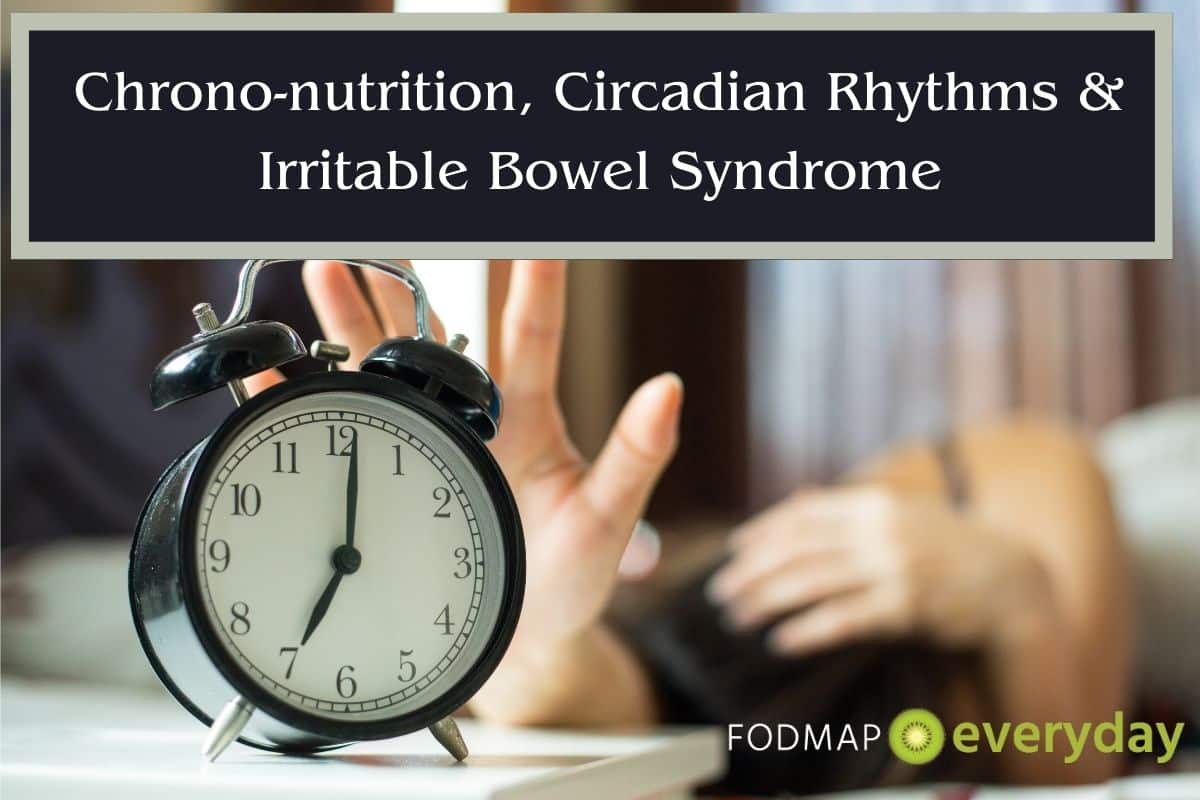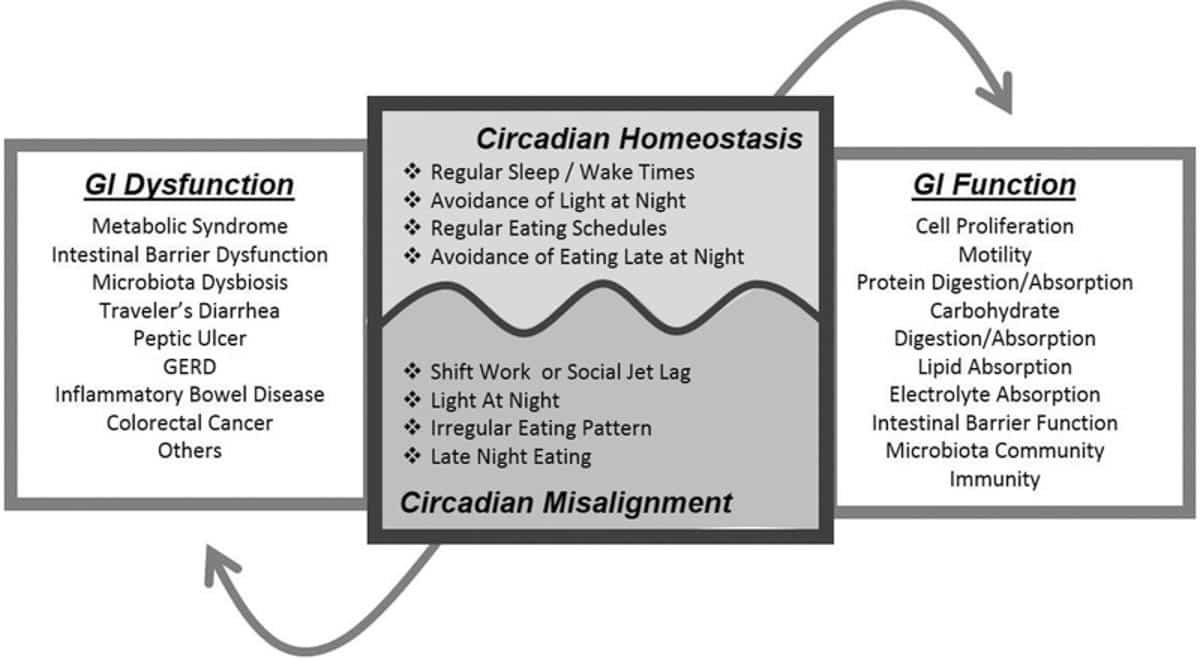We most often focus on what we eat, but how about when we choose to eat? Research is emerging in the field of chrono-nutrition, which examines the relationship between our eating times, circadian rhythms and metabolic health.
This article examines how meal timings and supporting our natural circadian rhythms (our sleep and wake cycles, which are often largely disrupted in today’s modern world) can impact our gut-health and subsequently IBS symptoms.

Digestion Is Affected By When You Eat
Have you ever wondered why you feel sleepy at night, and awake during the day? This is due to your circadian rhythms! In today’s modern world, there are many factors that can ‘disrupt’ our natural circadian rhythms.
However, there is emerging evidence that our circadian rhythms can play a significant role in our health and disruptions to our circadian rhythms can result in gastro-intestinal dysfunction.
We know that shift workers have higher rates of IBS (more on that in the article here).
Let’s get into what your circadian rhythms are, how they affect your digestive system, and how you can support your natural internal clocks to better support your digestive system and manage IBS!
What is Chrononutrition?
Chrononutrition (cool sounding name, eh?) is an up and coming field that looks at the relationship between our eating times, circadian rhythms and metabolic health evidence and research shows that aligning our food to periods of the day when circadian rhythms are optimized for nutrition and food breakdown may be very effective at metabolic health such as weight, body composition, blood sugars and more.
Further, there is growing research showing the important connection between our circadian rhythms and digestive processes – hence the inspiration for this blog post!
What Are Circadian Rhythms?
Most people use the term ‘circadian rhythm’ (singular) – but did you know that most organisms (including humans) have more than one?
Circadian rhythms are physical, mental and behavioral changes that follow a 24-hour cycle. These responses are primarily influenced by light and darkness.
A ‘biological clock’ is living organisms’ natural timing device, which regulates the cycle of the circadian rhythm. Did you know, every tissue and organ contains biological clocks?
The ‘master clock’ is a timing device in our brain which coordinates all the biological clocks in a living organism. In vertebrate animals such as humans, the master clock is a group of approximately 20,000 nerve cells that form a structure called the suprachiasmatic nucleus (SCN).
Our circadian rhythm impacts our health through:
- Hormone release
- Eating habits
- Digestion
- Body temperature
- Sleeping patterns
Sleep is the most noticeable aspect of our circadian rhythms – when it is dark, our SCN receives information about light from optic nerves in our eyes which send a message to the brain. When there is lower light (ie. at nighttime), the SCN tells the brain to make melatonin (our sleep hormone) so we get drowsy and fall asleep. This is why some people take melatonin to help them sleep at night.
What Impacts Our Circadian Rhythms?
In our modern day lifestyle, there are many factors that can affect our circadian rhythms and our light-dark cycle to be out of whack.
For example:
- Looking at screens (TV, phones, computers at nighttime) after sundown
- Bright lights to read at night
- Shift work
- Jet lag
Digestive System Influenced By Circadian Rhythm
There are a few ways that circadian rhythms may regulate our gastrointestinal functions. Here is an overview of the main ways:
Our intestinal barrier is essentially a protective wall in our gastrointestinal (GI) tract: it lets essential nutrients in, but aims to block out pathogens and foreign invaders. Our intestinal barrier’s strength and integrity plays a major role in our immunity as well as gut inflammation!
Data shows that there are ‘diurnal’ (aka daytime) changes in the intestinal barrier integrity. Due to this, it has been shown that shifting of light-dark cycles can influence the intestinal barrier integrity and may increase the risk of hyperpermeability (or the trendy term – “leaky gut”). It’s even been shown that shift workers (who have disrupted circadian patterns) may be more sensitive to alcohol, a known substance that impacts the intestinal barrier (more on that below).
Intestinal Microbiota
The intestinal microbiome is the collection of organisms that reside in the intestinal tract including bacteria, fungi, protozoa, and viruses. It’s been shown that the microbiota has day to day variations in both the amounts of certain bacteria as well as the function of those types of bacteria.
However, emerging data suggests that these fluctuations may not be “self-sustained” and are related to the circadian rhythm in the host. We are limited to animal data for now, but studies have shown that circadian disruption in the host (i.e., light to dark shifting) can result in dysbiosis (an abnormal level of pro inflammatory gut bacteria and decrease in healthy aka good gut bacteria.
Motility
Diurnal (aka activity in the daytime) changes in gut motility have been shown through the entire human GI tract including stomach, small and large intestine. Both small intestine and colonic activity are higher during the day, and less so at night – suggesting that our body is likely better at breaking down and digesting foods during the daytime, versus into the night.
Certain gene variations in our molecular “circadian clocks” have been associated with poor stomach motility in humans. Although more research is needed, it appears that disruption of human circadian rhythms may negatively affect GI motility and contribute to disorders where dysmotility is a feature such as Irritable Bowel Syndrome (and gastroparesis, functional dyspepsia and diabetes to name a few others).
This diagram below outlines how circadian ‘Homeostasis’ (aka balance) and circadian ‘misalignment’ may affect GI function.

Shift Workers & IBS
The discussion around shift work and health impacts has long had much attention. However, as of recent years, there has been more attention to the prevalence of IBS in shift workers. Shift work is characterized as work that falls outside the natural human activity hours of 7am and 6pm.
A 2022 meta-analysis (aka a review of all current studies on a topic within a recent time frame) looked at the association between shift work and two functional gut disorders, irritable bowel syndrome and functional dyspepsia. Eight studies were included. The meta-analysis found that the prevalence of IBS was 81% higher in shift workers.
Eating In Tune With Circadian Rhythm to Improve IBS Symptoms
Although more studies are needed in humans, it is clear that our circadian rhythms play a crucial role in our digestive health and functioning.
Considering that IBS is a functional gut disorder marked by dysmotility, dysbiosis, hypersensitivity of nerve endings, and altered gut-brain connection, it is likely that working to regulate our eating times, supporting sleep schedules, and honoring our natural circadian rhythms would provide benefit in our digestive health.
We’ve seen that shift work is associated with increased rates of IBS. We also know that sleep hygiene and quality plays a critical role in digestive health and IBS management.

You may want to read: How Does Sleep Impact IBS?
How to Support Your Natural Circadian Rhythms
With all this in mind, how can you better support your natural circadian rhythms?
These are the top areas to consider:
Light exposure: Follow the natural light of the sun. It can be incredibly helpful to get sun exposure within the first 2 hours of waking, to help send a signal to your SCN that it is daytime. In the evening when the sun naturally goes down, keep the lights in your home low. Limit or avoid the use of screens in the evening and before bed.
Sleep hygiene: Although difficult, it is important to keep a similar schedule for sleep and wake times each day (including weekends!). A buffer of around 1-hour is fine, but try not to have too much variation. For example, Monday – Friday, aim to sleep by 11pm and wake at 7:30am. Perhaps on weekends you have one night you stay up a little later, so you sleep at 11:30pm and wake at 8am.
Meal timing: The time of your meals can also influence your circadian rhythms, and as we’ve seen, your body is more primed to process and break down food during the day time. Aim to eat your food during the daytime, and avoid eating very early in the morning (before sunrise) and late at night (too close to bed).
Takeaway
The study of chrononutrition, circadian rhythms and functional gut disorders like IBS is still emerging. However, it is clear that meal timings and supporting our natural circadian rhythms, (which is often largely disrupted in today’s modern world) can impact our gut-health and may worsen IBS symptoms.
Let us know what you think of this article down below. Have you tried to adjust your eating time to help with IBS? Does sleep hygiene help with your digestive health? We’d love to hear from you!
Here is a summary of our discussion:
- This article is a discussion around how meal timings and supporting our natural circadian rhythms (which is often largely disrupted in today’s modern world) can impact our gut-health and subsequently IBS symptoms.
- More research in humans is needed, but it is clear that our digestive systems have diurnal (ie. daytime) activity and this can impact how we digest, absorb and break down food. Eating during the daytime and avoiding eating too early in the morning or late at night may help improve digestion and IBS.
- Studies indicate that shift workers (whose hours tend to fall outside the regular workday of 7am – 6pm) have higher incidences of IBS.
- We can support our natural circadian rhythms through meal timing (eating during the daytime and at regular intervals), sleep hygiene (keeping a consistent sleep-wake schedule), and light exposure (viewing morning sunlight, and avoiding artificial lights or bright lights after sun down).
Until next time,







